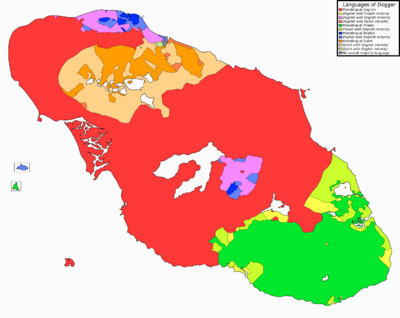Dogrish
Introduction
Dogrish (Dogrish: Dågrisk; Frisian: Doggersk; Dutch: Doggerlands) is a constructed language created for the purpose of being used in a constructed alternative world where, amongst other relatively minor additions, an island approximately the size of the Benelux exists on the location of the "real world" Dogger Bank.
Within the confines of the constructed universe, Dogrish is one of four languages spoken on the island of Dogger and its much smaller satellite islands, in addition to Dogric Frisian, English and Dutch. It is the most widely spoken language on the island and the official language of the national government, with minority language rights reserved for regional and local government use.
Situation
Dogrish is a North Germanic language belonging to the Insular Nordic sub-branch. As such it is most closely related to Icelandic, Faroese and extinct Norn. Most notable similarities include the preserved case system and the continued usage of the letters ð and þ to represent the voiced and voiceless dentale frictative respectively.
Standard Dogrish
There are two officially recognised standard varieties of Dogrish: Formal Dogrish (Dogrish: Formaldågrisk) is the most widely used on the island, with Valley Dogrish (Dogrish: Dalarnerdågrisk) being the officially recognised and used variety in the northwest of the island. Differences between the two officially recognised varieties are minor. In practice, however, the usage of these standard varieties in generally limited to the written word and supraregional interactions, as everyday interactions mostly take place in the local dialect.
Uniquely amongst Germanic languages, Formal Dogrish has preserved six grammatical cases, whereas Valley Dogrish has preserved five.[1] However, it should be noted that of all grammatical aspects of Dogrish, both the number of preserved cases as well as the specific cases being preserved vary considerably between dialects and localities, with some local varieties preserving only the nominative and the genitive in the declension of nouns.
Usage
Despite certain areas of the island being monolingually Frisian, English or Dutch, Dogrish is taught nationwide and understood by almost all inhabitants. In monolingually Frisian, English or Dutch areas of the island, bilingualism between the local language and one of the two standard varieties of Dogrish is the norm. The only exception to this is the urban area of St George's Haven in the northernmost corner of the island, where all signage, education and government communication is done only in English.
Phonology
Orthography
Consonants
Vowels
Prosody
Stress
Intonation
Phonotactics
Morphophonology
Morphology
Syntax
Constituent order
Noun phrase
Verb phrase
Sentence phrase
Dependent clauses
Example texts
| Dogrish | English translation | Meaning |
|---|---|---|
| Kitlið en drekka, þakið í flammar (Formal Dogrish) Kitlið en drækka, þakið í flammar (Valley Dogrish) |
If you tickle a dragon, your roof will catch fire You tickle a dragon, roof in flames (literally) |
Play stupid games, win stupid prizes. |
| Að komma á andensrupp. | To come at the duck's call. | To come right away. |
| Þrí veller í skógen, mörðrar ert flógen (Formal Dogrish) Þrí veller í skógen, mördrer ært flógen |
Three wells in the woods, the killer has fled | To run behind the facts. |
Other resources
Notes and references
- ^ Some local variaties, when using formal Dogrish, have preserved seven cases, but the usage of the seventh case, in casu the vocative, is generally considered archaic.
